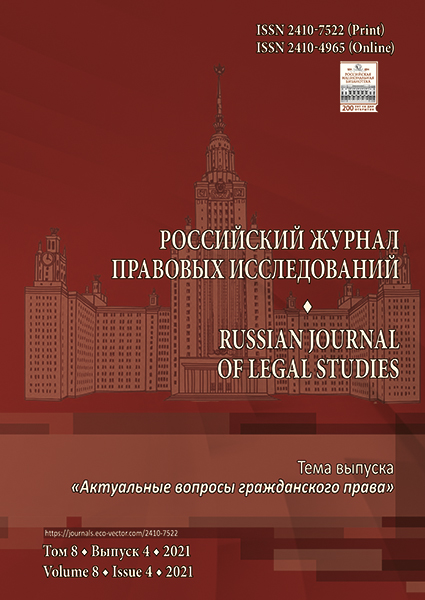Совершенствование системы налогообложения и его теоретическое обоснование
- Авторы: Селютина Т.С.1
-
Учреждения:
- Финансовый университет при Правительстве Российской Федерации
- Выпуск: Том 8, № 4 (2021)
- Страницы: 73-82
- Раздел: Право и экономика
- Статья получена: 09.11.2021
- Статья одобрена: 11.11.2021
- Статья опубликована: 18.01.2022
- URL: https://journals.eco-vector.com/2410-7522/article/view/87428
- DOI: https://doi.org/10.17816/RJLS87428
- ID: 87428
Цитировать
Полный текст
Аннотация
Налоги являются одним из основных рычагов воздействия государства на национальную экономику и одновременно важнейшим инструментом пополнения бюджета. Эти соображения оправдывают огромное значение правильного и гармоничного построения системы налогообложения, без чего немыслимо эффективное функционирование и устойчивое развитие народнохозяйственного комплекса страны. В настоящее время налоговая система России претерпевает определенные изменения, особенно в части прямого обложения доходов физических лиц, что требует сопоставления принимаемых решений с теоретическими положениями налоговой оптимизации. Следовательно, проблематика теоретического изучения применяемых и потенциально доступных налоговых инструментов именно в текущий период времени приобретает особую актуальность. Статья представляет собой авторское исследование теории экономики благосостояния как базиса для формирования практических решений в сфере формирования и совершенствования национальной налоговой системы. Это монографическое исследование работ зарубежных авторов и трактовка их результатов применительно к реалиям российской налоговой политики для обоснования вносимых в последнюю изменений или опровержения целесообразности таковых. В процессе достижения поставленных целей использовались методы научного познания: диалектический; анализа и синтеза. Исследование построено на изучении актуальной научной и периодической экономической литературы. Сделан вывод о целесообразности одновременного применения прямых и косвенных налогов при условии того, что в основе определения механизмов их использования будут лежать разные принципы, основанные на теории экономики благосостояния. Указано, что обложение доходов физических лиц является тем самым прямым налогом, применение которого зачастую основывается не только на соображениях экономической эффективности, но и на политических и социологических мотивах, в частности на понятии о справедливости, которое по определению субъективно и различается у разных общественных групп и политических партий. Тем не менее подчеркивается обязательный характер нелинейного обложения доходов физических лиц как с экономических, так и с политических позиций. Также сделан вывод о допустимости применения косвенного налогообложения, в частности, в форме налога на добавленную стоимость. Однако в данном случае, напротив, обоснована предпочтительность применения одинаковых налоговых ставок и избегания применения исключений из налоговой базы.
Ключевые слова
Полный текст
Об авторах
Татьяна Сергеевна Селютина
Финансовый университет при Правительстве Российской Федерации
Автор, ответственный за переписку.
Email: tatiana-selyutina@yandex.ru
ORCID iD: 0000-0001-8575-2479
кандидат экономических наук
Россия, МоскваСписок литературы
- Никонов И.В. Развитие теории оптимального налогообложения // Налоги и налогообложение. 2017. № 11. С. 54–61. doi: 10.7256/2454-065X.2017.11.24794
- Jacobs B. From optimal tax theory to applied tax policy // Finanzarchiv. 2013. Vol. 69. № 3. P. 338–389. doi: 10.1628/001522113X671155
- Saez E. Using elasticities to derive optimal income tax rates // Review of economic studies. 2001. Vol. 68. № 1. Р. 205–229.
- Christiansen V. Optimal participation taxes // CESifo (Munich). 2012. Working Paper. № 3941. P. 2–23.
- Farhi E., Gabaix X. Optimal taxation with behavioral agents // American economic review. 2020. Vol. 110. № 1. P. 298–336.
- Scherf R. Weinzierl M. Understanding different approaches to benefit-based taxation // Fiscal studies. 2020. Vol. 41. № 2. P. 385–410.
Дополнительные файлы








